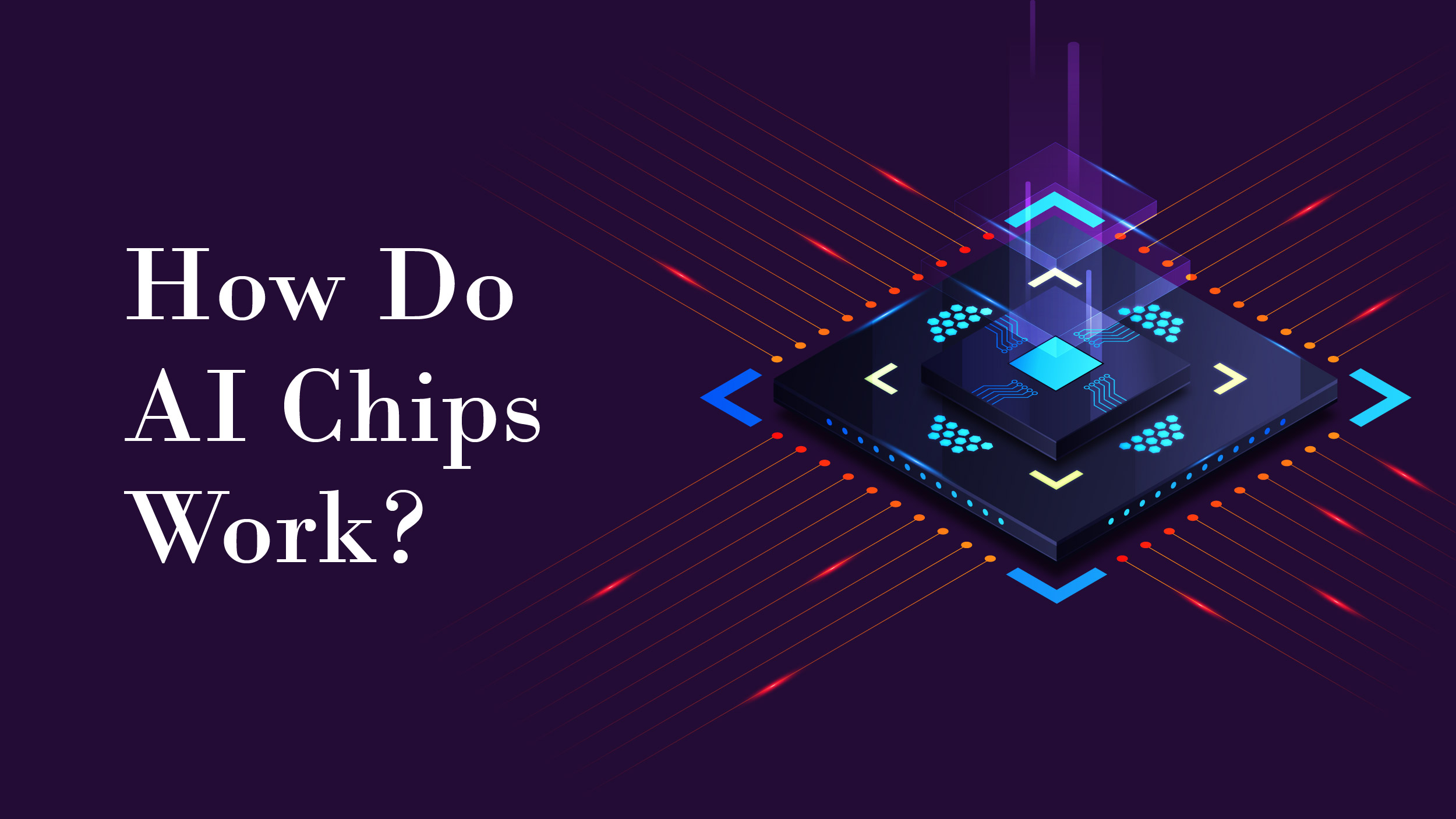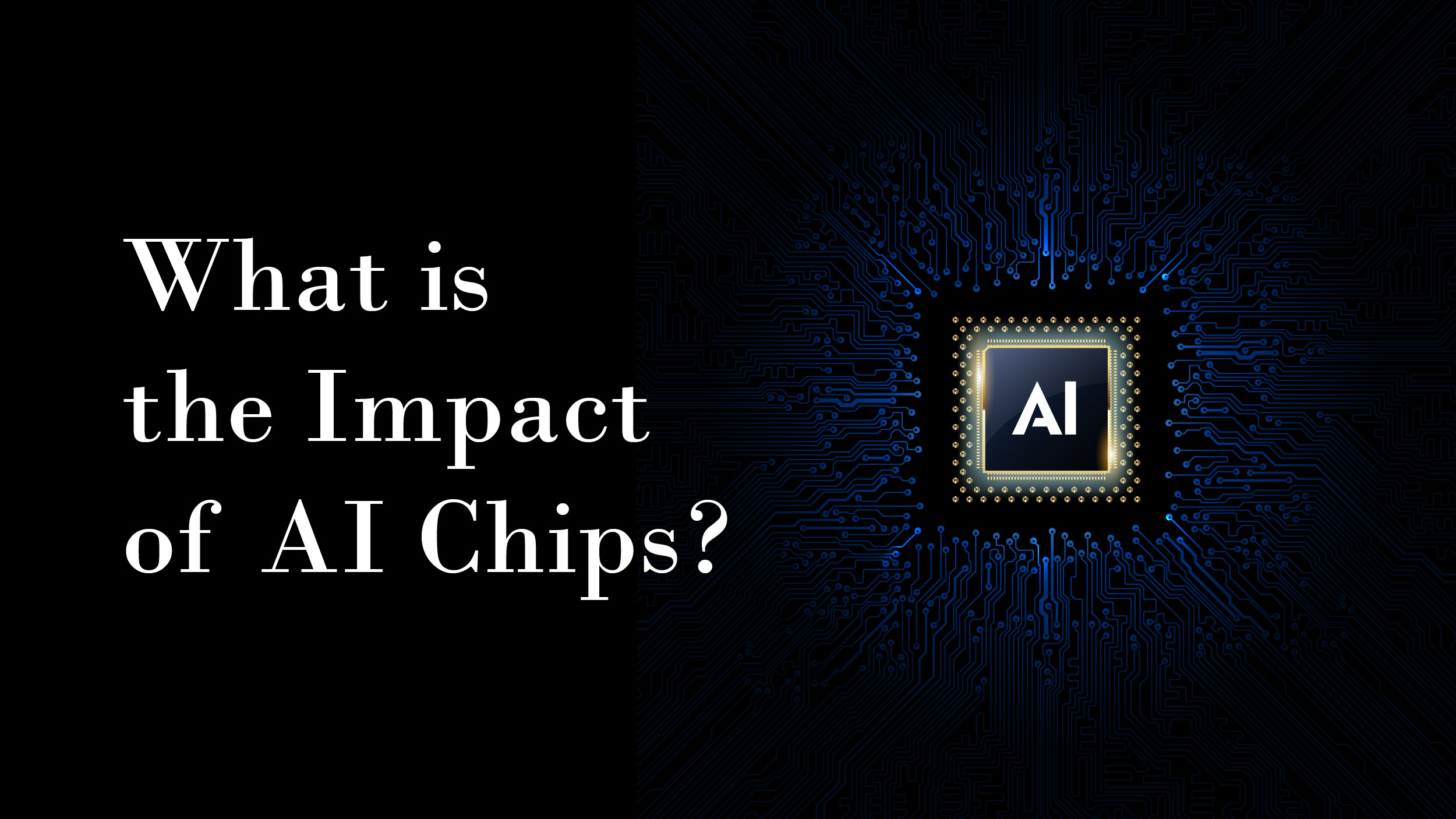Modern AI techniques require massive amounts of computation to succeed, which was unimaginable just a few years ago. How precisely are AI chips driving the large-scale research and application of AI, and why are they crucial? Let’s have a look.
What are AI Chips?
AI chips, also known as AI accelerators or neural processing units (NPUs), are specialized integrated circuits designed to accelerate AI computations. They are tailored to handle complex mathematical calculations required by AI algorithms, which makes them significantly faster and more energy-efficient than traditional CPUs and GPUs.
As opposed to general-purpose chips like central processing units (CPUs), these chips are created particularly to meet the computational needs of AI algorithms. They can analyze massive amounts of data simultaneously, which is essential for running and training cutting-edge AI models. Natural language processing, computer vision, robotics, healthcare, and other fields all use AI processors in some capacity.
The use of artificial intelligence chips makes it possible for faster and more effective AI computations, allowing AI systems to do complicated tasks more quickly and accurately. These chips are regarded as a crucial element in the creation and use of AI technologies and have grown in significance within the AI sector.
How Do AI Chips Work?

AI chips operate by utilizing a combination of hardware and software to process vast amounts of data and compute at lightning speed. The core principles of AI chip functionality include:
- Parallel Processing: These are designed to handle multiple tasks simultaneously, a fundamental requirement for AI and deep learning applications.
- Specialized Architectures: These chips employ dedicated architectures optimized for specific AI workloads, such as convolutional neural networks (CNNs) for image recognition or recurrent neural networks (RNNs) for natural language processing.
- Low-Precision Arithmetic: These chips often use lower-precision arithmetic, such as 8-bit or 16-bit, to speed up calculations without compromising accuracy.
- On-Chip Memory: These chips incorporate high-speed memory caches to reduce data latency, enhancing their overall performance.
AI chips have abruptly seized the spotlight in what a cadre of experts perceives as an AI revolution capable of reshaping not only the technology sector but the world as we know it.
Types of AI Chips
Given below are the different types of artificial intelligence chips:
- Graphics Processing Units (GPUs): Originally designed for rendering graphics, GPUs have been repurposed as powerful AI accelerators due to their ability to perform parallel computations.
- Application-Specific Integrated Circuits (ASICs): These chips are custom-built for specific AI tasks, providing unparalleled performance but limited flexibility.
- Field-Programmable Gate Arrays (FPGAs): FPGAs offer a balance between flexibility and performance, allowing users to reconfigure the chip’s logic for different AI workloads.
- Tensor Processing Units (TPUs): Developed by Google, TPUs are designed specifically for deep learning tasks, offering exceptional speed and efficiency for neural network computations.
History of Modern Chips
Now that we have an idea about AI chips, let’s take a closer look at one of its first manufacturers – Nvidia.
Nvidia, the foremost AI chip designer, witnessed an astonishing surge of nearly 25% in its stock price in June 2023. This surge was driven by the company’s projection of a substantial revenue increase, an indicator of the surging demand for its products. In a noteworthy milestone, Nvidia’s market valuation briefly exceeded the $1 trillion mark in June.
In a span of eleven years, Nvidia has asserted its dominance as the primary supplier of chips crucial for constructing and upgrading AI systems. It recently launched the H100 GPU, which has redefined the benchmarks of AI computing. With a staggering 80 billion transistors, this powerhouse outshines Apple’s latest high-end MacBook Pro processor by an astounding 13 million transistors.
Nvidia’s strategic approach to chip manufacturing differs from the conventional method of in-house fabrication. Instead of embarking on the colossal endeavor of establishing new factories, Nvidia partners with Asian chip foundries, including Taiwan Semiconductor Manufacturing Co. and Korea’s Samsung Electronics. This collaborative approach allows them to focus on innovation while harnessing the manufacturing expertise of these global giants.
Cloud computing services, notably Amazon and Microsoft, stand as some of the most significant consumers of artificial intelligence chips. As these firms rent out their AI computing prowess, these services democratize access to AI capabilities. Smaller companies and groups that might not have the resources to develop AI systems from scratch, can leverage cloud-based tools for diverse applications ranging from drug discovery to efficient customer management. In essence, Nvidia’s AI chips are the engines driving the next wave of innovation, making AI accessible to a broader spectrum of industries and businesses.
What is the Impact of AI Chips?

The advent of artificial intelligence chips has ushered in a new era of technological advancements with far-reaching implications:
- The Omnipresence of AI: These chips have made it possible to embed AI capabilities in a wide range of devices, from smartphones and autonomous vehicles to healthcare equipment and household appliances.
- Faster Training: Training complex AI models that once took weeks can now be accomplished in hours or even minutes, democratizing AI research and development.
- Energy Efficiency: AI chips consume significantly less power than traditional processors, leading to reduced energy costs and a smaller carbon footprint.
- AI in Real-Time: Artificial intelligence chips enable real-time decision-making in critical applications like autonomous vehicles, healthcare diagnostics, and financial trading.
- Industry Transformation: These chips are revolutionizing industries such as healthcare, finance, manufacturing, and entertainment, making processes more efficient and unlocking new opportunities.
Applications of AI Chips
Here are some of the primary applications of these chips:
- Image and Video Recognition: These are widely used in applications like image classification, object detection, and facial recognition. They enable devices and systems to identify and analyze visual data with exceptional speed and accuracy. This has applications in security, autonomous vehicles, and healthcare imaging.
- Natural Language Processing (NLP): Artificial intelligence chips play a crucial role in processing and understanding human language. These chips power voice assistants, chatbots, language translation services, and sentiment analysis tools, making communication between humans and machines more natural and efficient.
- Recommendation Systems: In the e-commerce, entertainment, and content streaming industries, these chips are used to build recommendation algorithms that suggest products, movies, music, or content to users based on their preferences and behaviors.
- Autonomous Vehicles: Artificial intelligence chips are a critical component in autonomous vehicles, enabling real-time perception, decision-making, and control systems. They process data from sensors like LiDAR, radar, and cameras to navigate and make split-second driving decisions.
- Healthcare: In healthcare, these chips are employed for medical image analysis (e.g., MRI and CT scans), drug discovery, personalized treatment plans, and remote patient monitoring. They assist in diagnosing diseases, predicting patient outcomes, and improving medical research.
- Financial Services: These chips are used for algorithmic trading, fraud detection, credit scoring, and risk assessment in the financial sector. They analyze large datasets to identify patterns and anomalies for better decision-making.
- Manufacturing and Quality Control: Artificial intelligence chips are integrated into manufacturing processes to optimize production, monitor equipment health, and conduct quality control inspections. They help identify defects and prevent costly downtime.
- Energy Management: In energy-intensive industries, artificial intelligence chips are used for predictive maintenance of equipment and energy consumption optimization. They can identify areas for efficiency improvements and reduce energy costs.
- Agriculture: These chips enable precision agriculture by analyzing data from sensors and drones to optimize planting, irrigation, and harvesting. They help farmers increase crop yields while minimizing resource usage.
- Robotics: In robotics, AI chips provide the computational power required for autonomous navigation, object manipulation, and human-robot interaction. They play a vital role in industrial automation, healthcare robots, and service robots.
- Gaming: Artificial intelligence chips are used in gaming consoles and GPUs to enhance gaming experiences. They enable real-time rendering, physics simulations, and AI-driven NPCs for more immersive gameplay.
- Data Centers: Data centers use chips to accelerate machine learning tasks, making data analysis and processing more efficient. This improves the performance of cloud services, data analytics, and data-driven applications.
These are just a few examples of the diverse applications of artificial intelligence chips. As AI continues to advance and permeate various industries, the demand for specialized hardware accelerators will continue to grow, enabling more efficient and powerful AI-driven solutions.
In a Nutshell
AI chips are the key to unlocking the full potential of artificial intelligence. With their ability to accelerate the performance of AI applications, these chips are enabling the development of new and innovative products and services that are transforming the world around us. As technology continues to advance, we can expect even more powerful and efficient chips to shape the future of the world and redefine what humankind can achieve.




